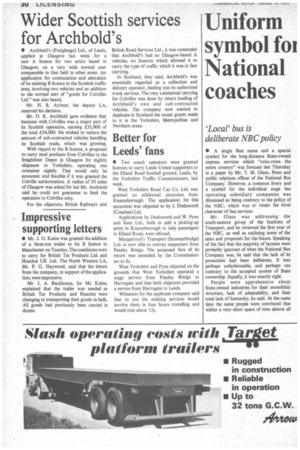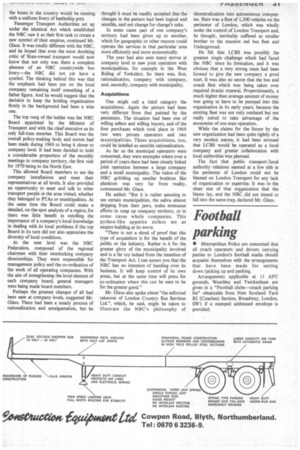'Local' bus is deliberate NBC policy
Page 32

Page 33

If you've noticed an error in this article please click here to report it so we can fix it.
• A single fleet name and a special symbol for the long-distance State-owned express services which "criss-cross the entire country" was forecast last Thursday in a paper by Mr. T. M. Glass, Press and public relations officer of the National Bus Company. However, a common livery and a symbol for the individual stage bus operating subsidiary companies was dismissed as being contrary to the policy of the NBC, which was to retain the local character of bus services.
Mr. Glass was addressing the south-eastern group of the Institute of Transport, and he reviewed the first year of the NBC, as well as outlining some of the aims and proposals for the future. Speaking of the fact that the majority of laymen were probably ignorant of what the National Bus Company was, he said that the lack of its promotion had been deliberate. It was perhaps unfashionable, and perhaps ran contrary to the accepted system of State ownership. Equally, it was exactly right.
People were apprehensive about State-owned industries for their monolithic structure, lack of adaptability, and their total lack of humanity, he said. At the same time the same people were convinced that within a very short space of time almost all the buses in the country would be running with a uniform livery of battleship grey.
Passenger Transport Authorities set up under the identical Act which established the NBC saw it as their first task to create a new symbol of their empires, continued Mr. Glass. It was totally different with the NBC, and he hoped that even the most doubting critic of State-owned transport would now know that not only was there a complete absence of an NBC countrywide bus livery—the NBC did not yet have a symbol. The thinking behind this was that the emphasis had been put on the local company remaining itself something of a father figure. And he would suggest that the decision to keep the holding organization firmly in the background had been a wise one.
The top rung of the ladder was the NBC Board appointed by the Minister of Transport and with the chief executive as its only full-time member. This Board was the overall policy-making body and moves had been made during 1969 to bring it closer to company level. It had been decided to hold a considerable proportion of the monthly meetings in company territory, the first visit for 1970 being to the North East.
This allowed Board members to see the company installations and meet their representatives at all levels. It also provided an opportunity to meet and talk to other transport people in the area visited, whether they belonged to PTAs or municipalities. At the same time the Board could make a detailed, on-the-spot analysis of a region, for there was little benefit in extolling the importance of a company's local knowledge in dealing with its local problems if the top Board in its turn did not also appreciate the diversity of local conditions.
At the next level was the NBC Federation, composed of the regional chairmen with their interlocking company directorships. They were responsible for management policy and the co-ordination of the work of all operating companies. With the aim of strengthening the local element of each company board, general managers were being made board members.
Perhaps the greatest changes of all had been seen at company levels, suggested Mr. Glass. There had been a steady process of rationalization and amalgamation, but he thought it must be readily accepted that the changes in the pattern had been logical and sensible, and not change for change's sake.
In some cases part of one company's territory had been given up to another, which for geographic or other reasons could operate the services in that particular area more efficiently and more economically.
The year had also seen many moves at company level in new joint operation with municipalities, for example in the West Riding of Yorkshire. So there was, first, rationalization, company with company, and, secondly, company with municipality.
Acquisitions One might call a third category the acquisitions. Again the picture had been very different from that painted by the pessimists. The situation had been one of willing sellers and willing buyers, and of the four purchases which took place in 1969 two were private operators and two municipalities. These acquisitions, too, could be labelled as sensible rationalization.
As far as the municipal operators were concerned, they were examples where over a period of years there had been closely linked joint operation between a large company and a small municipality. The vision of the NBC gobbling up smaller brethren like plankton was very far from reality, commented Mr. Glass.
He added: "But it is rather amusing to see certain municipalities, the saliva almost dripping from their jaws, make strenuous efforts to snap up company territory, or in some cases whole companies. This python-like appetite strikes me as empire-building at its worst.
"There is not a shred of proof that this type of acquisition is for the benefit of the public or the industry. Rather is it for the greater glory of the municipality involved and is a far cry indeed from the intention of the Transport Act. I can assure you that the NBC has no intention of handing over its business. It will keep control of its own areas, but at the same time will press for co-ordination where this can be seen to be for the greater good."
Mr. Glass also spoke about "the enforced takeover of London Country Bus Services Ltd.", which, he said, might be taken to illustrate the NBC's philosophy of decentralization into autonomous companies. Here was a fleet of 1,300 vehicles on the perimeter of London, which was wholly under the control of London Transport and, he thought, inevitably suffered as smaller brother to the massive red bus fleet and Underground.
He felt that LCBS was possibly the greatest single challenge which had faced the NBC since its formation, and it was obvious that a very strong team had been formed to give the new company a good start. It was also no secret that the bus and coach fleet which was being taken over required drastic renewal. Proportionately, a much higher than average amount of money was going to have to be pumped into this organization in its early years, because the existing fleet was not only outdated but not really suited to take advantage of the economies of one-man operation.
While the claims for the future by the new organization had been quite rightly of a very modest nature, it had been stressed that LCBS would be operated as a local company and greater collaboration with local authorities was planned.
The fact that public transport/local authority relations seemed at a low ebb in the perimeter of London could not be blamed on London Transport for any lack of organization or expertise. It was in the sheer size of that organization that the blame lay, and the NBC did not intend to fall into the same trap, declared Mr. Glass.
































































































